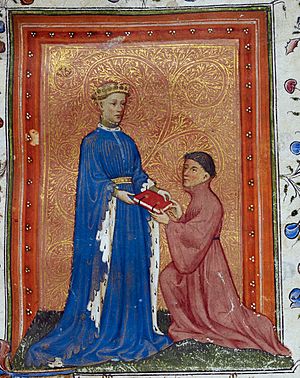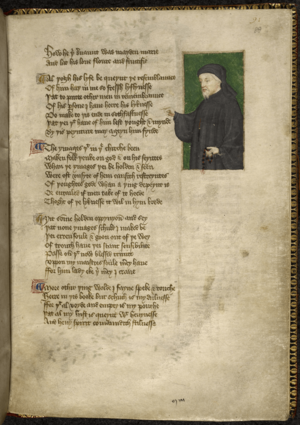Thomas Hoccleve facts for kids

Thomas Hoccleve (born 1368 or 1369, died 1426) was an important writer in the 1400s. He wrote in Middle English, which was the English language spoken back then. He helped make Geoffrey Chaucer famous, calling him "the father of English literature." Hoccleve was also a poet himself. His longest poem, called Regement of Princes, was very popular in the 1400s. However, people mostly forgot about his work until the late 1900s. Today, he is best known for his collection of poems called the Series. This collection includes the first time someone in English wrote about their own experience with mental health challenges. Hoccleve also copied many books by hand. He even wrote hundreds of official papers in French and Latin because he worked as a clerk for the Office of the Privy Seal.
Contents
About Thomas Hoccleve
Thomas Hoccleve was born in 1368. We know this because he wrote in 1421 that he was "fifty wyntir and three" (53 years old). We don't know much about his family, but they might have come from a village called Hockliffe in England.
Most of what we know about Hoccleve's life comes from his own writings and old government records. When he was about 18 or 19, he got a job as a clerk in the Office of the Privy Seal. He kept this job for about 35 years, even though he often complained about it. In 1399, the new king, Henry IV, promised him a yearly payment. But Hoccleve often complained that he didn't get paid on time or in full.
Hoccleve wasn't known for having a very successful career. His first known poem, The Letter to Cupid, was written in 1402. It was a translation of a French poem. At the time, England was becoming more nationalistic, and this poem might have seemed too French. This was just before the Hundred Years' War started again between England and France.
By 1410, Hoccleve had married "only for love." He couldn't get a church job because he was married, as married clerks usually weren't allowed to hold government positions back then. He started writing poems about morals and religion. Around 1411, he wrote his most famous poem, Regement of Princes, and gave it to the future king, Henry V.
After writing the Regement, Hoccleve went through a difficult time with his mental health. He got better in 1415. But in 1420, he wrote that people still treated him differently because of it. This made it hard for him, especially since his most successful work was meant to teach people. In another poem, he also wrote about his eyesight getting worse, which made his work as a copyist even harder.
Thomas Hoccleve died shortly after March 1426. His allowance for food and clothing was given to someone else in May 1426, which means he had passed away.
Hoccleve's Writings
Hoccleve was very important in making Geoffrey Chaucer known as the "father" of English literature. He also respected John Gower and saw himself as following in their footsteps. Even though his Regiment of Princes was very popular at first, another writer named John Lydgate soon became more famous.
Later readers found the Regiment a bit boring. It wasn't until the 1970s that people started to truly appreciate Hoccleve's work. Scholars now value his poems because they give us a look into what it was like to read and write in England during the time of the Lancastrian kings. People especially like his honest descriptions of his own life, like his experience with mental health challenges in Complaint and Dialogue (written in 1420). His poem La Male Regle (around 1406) is also popular. It's a funny poem that gives us some hints about his younger days.
Hoccleve's writing style is quite simple and clear. He often joked that he wasn't as good a poet as Chaucer. He wrote, "Father Chaucer would have taught me, but I was dull and learned little or nothing." But this was a common way for writers to act humble back then, even Chaucer did it! This idea of being humble became a popular way for authors to introduce themselves in later times.
The Regiment of Princes
The Regement of Princes was written for Henry V of England just before he became king. It's a poem that teaches about good qualities and bad habits. Hoccleve based it on older Latin works. The Regement was very popular and still exists in at least 43 handwritten copies. The poem also talks about Henry V's family history to help strengthen the House of Lancaster's claim to the English throne. The beginning of the poem is quite long and includes fun stories about London tavern life, told through a conversation between the poet and an old man.
The Series
The Series is a collection of poems that includes parts of Hoccleve's own life story, along with translations of other texts and moral lessons. It starts with a poem called Complaint. In this poem, Hoccleve describes a time when he was very unwell, saying he temporarily lost his "wit" and "memorie." This is the earliest known personal description of mental illness written in English. He writes that he recovered five years before, but people still gossiped about his illness, which made him feel alone.
The Series continues with "Dialogue with a Friend." In this poem, Hoccleve describes himself as a poor poet, now 53 years old, with bad eyesight and a troubled mind. He tells his friend about his plans to write a story for his patron, Humphrey of Gloucester. He also plans to translate a part of Henry Suso's Latin book about how to die well. His friend tells him not to study too much, saying that too much studying caused his mental health problems. The Series then includes the stories Hoccleve planned to write, like Jereslaus' Wife and Jonathas. It also includes his translation of the Latin book about dying, called Learn to die. This collection of poems is connected to the death of Hoccleve's friend and colleague, John Bailey, in 1420. We still have two handwritten copies of the Series that were written by Hoccleve himself.
Hoccleve's Handwriting
Thomas Hoccleve left behind more handwritten books and documents than any other known English writer from the Middle Ages. We believe he wrote four main literary books mostly or entirely by hand:
- Durham University Library, Cosin MS V. iii. 9 (which contains The Series)
- San Marino, Huntington Library MSS HM 111 and HM 744 (collections of his shorter poems)
- London, British Library, MS Harley 219 (which has parts of other works and a language guide)
His handwriting has also been found in parts of other literary books, where he acted as a copyist or corrected mistakes. He was one of the scribes who copied John Gower's Confessio Amantis. Some people even think he was the first person to edit Chaucer's famous Canterbury Tales. Hoccleve also wrote most of the Privy Seal Formulary, a book of official forms, and hundreds of other documents for his job.
Published Works
In the 1600s, a poet named William Browne admired Hoccleve's work. He included Hoccleve's poem Jonathas in his own book in 1614. Browne even wanted to publish all of Hoccleve's poems. In 1796, George Mason printed "Six Poems by Thomas Hoccleve never before printed."
Later, in the 1800s, the De Regimine Principum was printed by the Roxburghe Club and the Early English Text Society. Frederick James Furnivall put together a complete collection of Hoccleve's works, which is still used by scholars today. In 1981, Michael Seymour published Selections from Hoccleve, which is a great way for readers to get a taste of Hoccleve's main poems. More recently, in 1999, J. A. Burrow created a new edition of Hoccleve's Complaint and Dialogue, and Charles Blyth made a new edition of The Regiment of Princes. These newer editions are easier to read because they use more modern spelling, which is helpful for students. All these recent editions have introductions that help us understand this poet who was not appreciated enough for a long time.
 | Isaac Myers |
 | D. Hamilton Jackson |
 | A. Philip Randolph |


